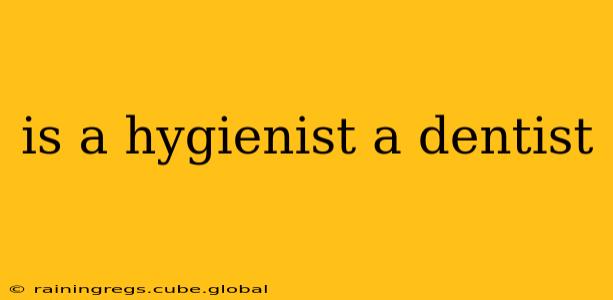The short answer is no, a dental hygienist is not a dentist. While both work in the dental field and collaborate closely, their roles, training, and scope of practice are distinctly different. This article will clarify the differences and answer some frequently asked questions.
What Does a Dental Hygienist Do?
Dental hygienists are licensed healthcare professionals who focus on the prevention of oral diseases and the maintenance of oral health. Their primary responsibilities include:
- Cleaning teeth: This involves removing plaque and tartar buildup, polishing teeth, and flossing.
- Educating patients: Hygienists provide patients with guidance on proper oral hygiene techniques, including brushing, flossing, and the use of mouthwash. They also educate on diet and lifestyle choices that impact oral health.
- Applying fluoride: This helps strengthen tooth enamel and prevent cavities.
- Taking x-rays: Hygienists often take and develop dental x-rays to help dentists diagnose oral health problems.
- Identifying oral diseases: They screen for gingivitis, periodontitis, oral cancer, and other conditions, reporting their findings to the dentist.
What Does a Dentist Do?
Dentists are licensed medical professionals who diagnose, treat, and prevent diseases and conditions of the teeth, gums, and oral cavity. Their responsibilities are far broader than those of a hygienist and include:
- Diagnosing and treating dental diseases: This encompasses everything from cavities and gum disease to more complex issues like oral surgery and orthodontics.
- Performing restorative procedures: This includes fillings, crowns, bridges, and dentures.
- Extracting teeth: Dentists are trained to remove teeth that are damaged or diseased.
- Prescribing medication: Dentists can prescribe antibiotics and other medications to treat oral infections and pain.
- Performing surgical procedures: This can range from simple extractions to more complex oral surgeries.
- Developing treatment plans: Dentists create comprehensive treatment plans based on patient needs and diagnoses.
What is the Difference in Training and Education?
The educational pathways for dentists and hygienists differ significantly:
- Dentists: Must complete a four-year doctoral program (DMD or DDS) after completing undergraduate studies. This intensive program involves extensive coursework, clinical rotations, and examinations.
- Dental Hygienists: Typically require an associate's or bachelor's degree in dental hygiene. The curriculum includes coursework in dental science, hygiene techniques, and patient care. They also undergo rigorous clinical training and licensing examinations.
Are Dental Hygienists Part of a Dental Team?
Yes, dental hygienists are integral members of the dental team. They work closely with dentists, providing essential preventative care and assisting with diagnostics. The hygienist's role is crucial in maintaining the overall health of a patient's mouth.
Can a Hygienist Diagnose Dental Problems?
No, dental hygienists cannot diagnose dental problems. While they can identify potential issues and report their findings to the dentist, only a dentist can make a formal diagnosis and create a treatment plan.
Can a Hygienist Perform Procedures a Dentist Does?
No, dental hygienists cannot perform procedures typically done by dentists. Their scope of practice is limited to preventative care and assisting the dentist. Any procedures requiring advanced training and skills must be performed by a licensed dentist.
In Conclusion
While dental hygienists and dentists work together to provide comprehensive oral care, their roles, training, and scope of practice are fundamentally different. Hygienists focus on prevention and maintenance, while dentists diagnose, treat, and manage a wide range of dental conditions. Understanding these distinctions is crucial for patients seeking appropriate oral healthcare.
